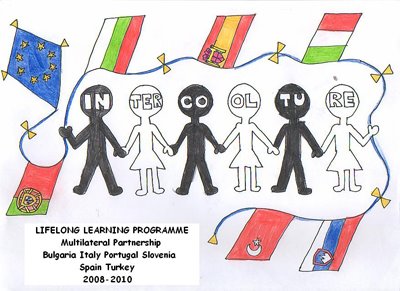To promote co-operations among schools of different European countries.
To deepen the knowledge of other cultures, languages and national education systems, particularly
referring to the programs of intercultural education.
To encourage cross-curricular ways of working.
To carry out an innovative didactic course, in which knowledge is strictly linked with one’s planning
creativeness and operative ability, through the use of means, instruments and languages of the
scientific education and those of the new technologies of information and communication (ICT).
To make children the real protagonists of the whole course during all its phases of research,
planning and carrying out, appealing to their spontaneous interest and to their own resources,
using a kind of work aimed at the development of children’s eagerness for concrete
experimentation.
To involve and sensitize the whole school and local communities about the topics of the project.
To become self-aware: to reflect upon each one’s personal features, recognizing the characteristic
elements of each personal identity.
to overcome superficial opinions and prejudices; to bring up to comparison, reflecting upon the
meanings of diversity; to be aware of the fact that diversity can be an element that enriches reality
and human experience.
to promote the reciprocal knowledge, the exchange of information and the value of differences.
To promote positive attitudes towards themselves and others, in order to live peacefully together:
to help children to develop the listening competence.
To recognize each one’s point of view.
To look for effective communicative approaches.
To find methods to handle conflict.
To know the function of the rules for life in common, as instrument to make social life easier, to
safeguard oneself, the others and the environment: to identify one’s own rights and duties; to
create rules for a civil and peaceful life in common.
To awaken children to respect racial and cultural differences, encouraging ethnic and cultural
tolerance: to know some cooperation and solidarity organizations, analyzing their main aims and
actions; to recognize the value of solidarity as assertion of citizenship and service to other people.
To research information about some important historical characters and symbols of peace; to know
other countries cultures and traditions, discovering similarities and differences.
To be aware of the national identities of the different European countries.
To find the links between the places, the subjects, the invention, production and diffusion of the
different musical genres/artistic techniques of decoration and the places, the subjects and the
times of some historical events in order to foster a new kind of learning in a school that can be
really open to intercultural and inter-generational dialogue.
To promote intercultural conscience through European cooperation between groups of pupils and
teachers from different European countries.
To promote cultural awareness in order for pupils to lead richer lives and in the long term, make a
valuable contribution to society.
